Are Crypto Transactions Expensive? Let’s Break It Down
Are Crypto Transactions Expensive? Let’s Break It Down
Are Crypto Transactions Expensive? Let’s Break It Down
Are Crypto Transactions Expensive? Let’s Break It Down






Yes, cryptocurrency is the future of money and all. But are crypto transaction fees way too high? Well, if you've ever had this thought, you're not alone. Bitcoin fees, for example, average between AED 1.84 and AED 25 per transaction, while cash payments often come with a 2.09% fee. Don't forget that for traditional payments, there are also charges like processing and documentation fees, which can range from AED 315 to AED 1,050.
So, are crypto transactions that expensive? Read on as we break this down. You will discover why these crypto fees exist and, more importantly, how you can keep them as low as possible.
What Are Crypto Transaction Fees?
Crypto transaction fees, or gas fees, are small payments you make when making transactions through crypto. These fees go to miners or validators, who process your transactions and keep the blockchain secure. It is just like paying delivery fees when you order food online — a small charge to get the service done. Without these fees, your transaction would not be processed.

Average Bitcoin gas fee between 2017 and 2023. Source: The Block.
Different cryptocurrencies have different fees. For example, the average cost for Bitcoin right now is AED 25, while Ethereum is 11.8 Gwei, and Ripple is less than AED 1. The price depends on how busy the network is and how complex your transaction is. If a lot of people are using the blockchain at the same time, fees go up because everyone’s competing to get their transaction through faster.
Here’s a look at the average fees for popular cryptocurrencies:
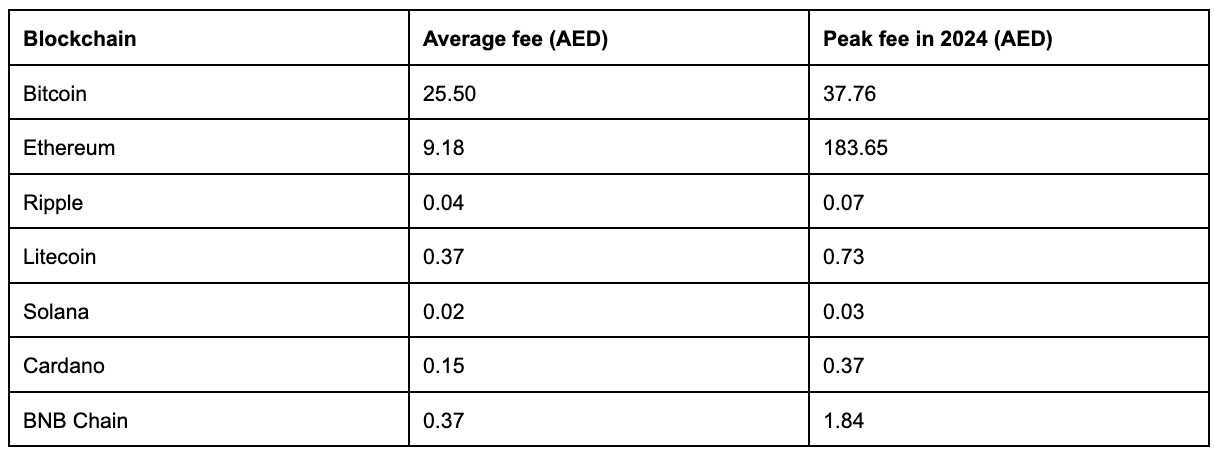
Each blockchain has its own fee system, but if you know when and how to transact, you can save a lot.
Traditional Payment Fees vs. Crypto Fees
Crypto transaction fees are often much cheaper than traditional payment systems like credit cards, bank transfers, or checks. Let’s break it down in a way that makes sense.
When you buy something online using your bank credit card, the store pays a processing fee of 1.5% to 3.5% of your total purchase. For example, if you buy shoes for AED 500, the store might pay up to AED 17.50 in fees just to accept your card.
Debit cards are cheaper for businesses, with an average fee of 0.74% or about AED 1.70 per transaction. These fees are there because card networks (like Visa or Mastercard) and banks charge to process the payment and make sure it goes through safely.
Wire transfer is another traditional payment method. If you send money to someone in another country, it could cost you between AED 128.45 and AED 183.50. Even domestic transfers can cost AED 0.50 to AED 128.45.
The high cost is due to the fact that banks have to handle currency conversions and double-check every detail to avoid errors. Checks, though rare these days, cost businesses anywhere from AED 14.68 to AED 73.40 per check due to bank fees, labor, and postage.
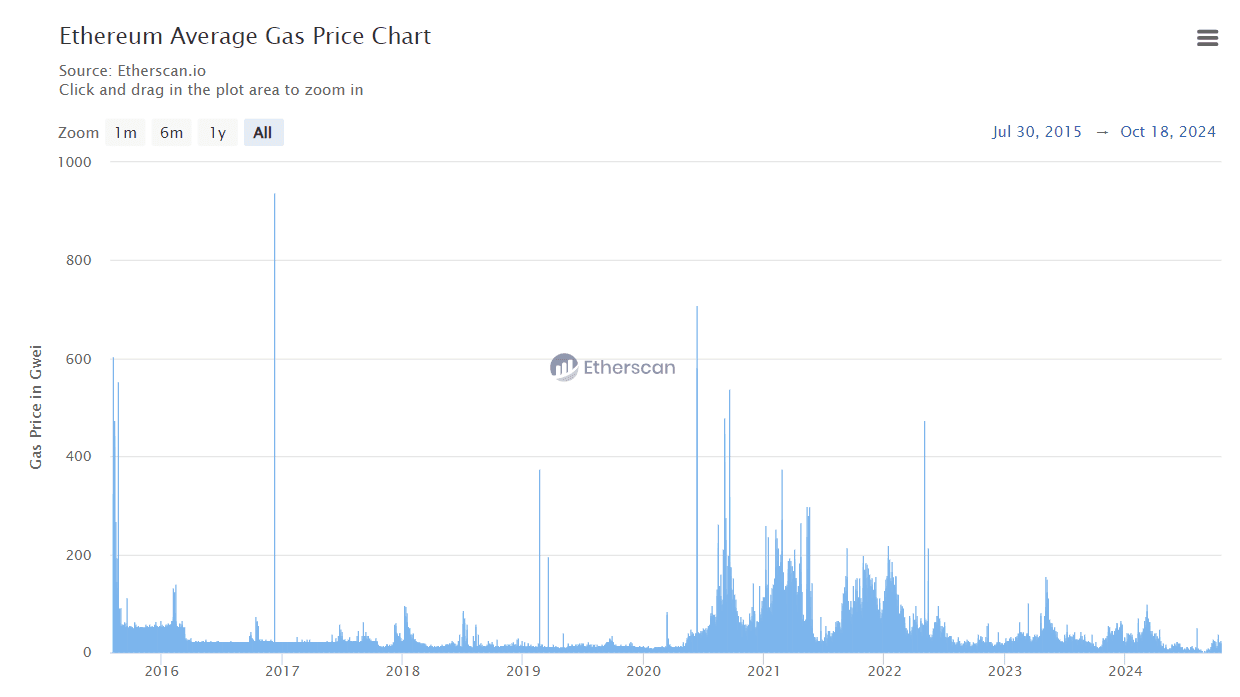
Ethereum gas fee between 2016 and 2024. Source: EtherScan.
In comparison, crypto fees are most times lower, depending on the cryptocurrency you use. For instance, Ethereum's average transaction fee is around 0.24 Gwei (AED 0.88), which is far cheaper than an international wire transfer.
Ripple is even cheaper at just $0.01 (AED 0.04) per transaction. The reason crypto is more affordable is that it cuts out middlemen (banks and payment processors), and transactions are directly processed on the blockchain.
Here’s a table to quickly compare the fees:
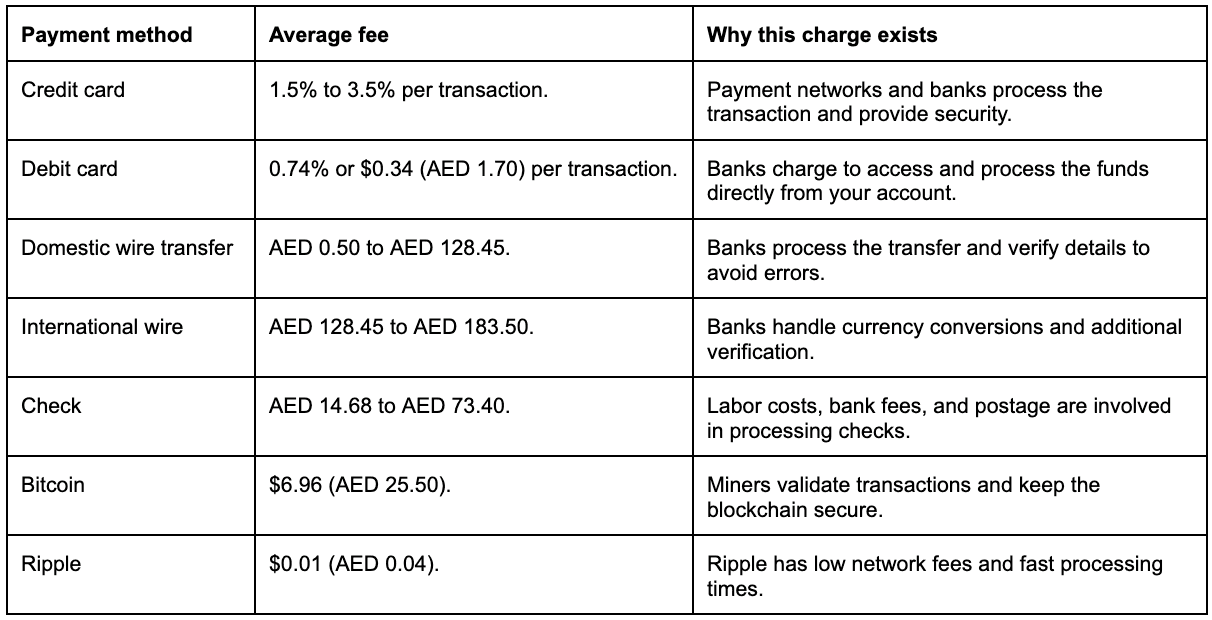
As you have seen, crypto transaction fees are generally lower than traditional systems, especially for large or international payments. Plus, when you choose the right crypto, you can save even more.
Breaking Down Gas Fees
Gas fees are like the service charges you pay for using the blockchain networks. When you send crypto or use smart contracts, the network needs to do some "work" to process your transaction, and it is the gas fees that cover this work. The amount you pay for gas depends on how busy the network is and how much computational power your transaction needs.
Here’s a breakdown of why gas fees might go up:
1. Network Traffic
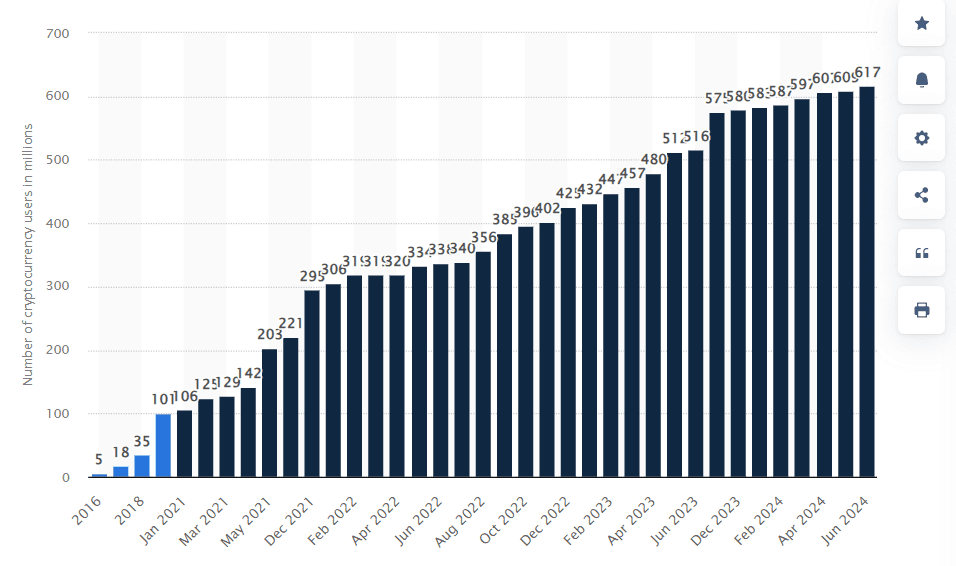
Number of crypto users between 2016 and 2024. Source: Statista.
Cryptocurrency has surged in demand as there are more users and dApps. So, imagine trying to order food online when there's a big event nearby. The more people order food at the same time, the longer it takes to get your food, and you might even have to pay more for faster delivery. Blockchain networks work in a similar way. When too many people use the network at once, the fees rise because everyone’s trying to get their transactions through quickly.
2. Transaction Complexity
Sending crypto is usually cheap and easy. But if you’re using apps that are complicated on the blockchain, like DeFi or NFTs, it’s like ordering a five-course meal instead of a simple sandwich. More complex transactions use more computing power, and that pushes the fees up.
3. Block Size Limits
Blockchain transactions are packed into blocks, but each block can only handle so much data. When the network is crowded, miners will choose to process transactions from those willing to pay more in gas fees first, while others wait longer and might even have to pay more if the block is full.
In short, gas fees increase based on how busy the network is, how complex your transaction is, and how much space is available in the next block.
How to Avoid High Crypto Fees
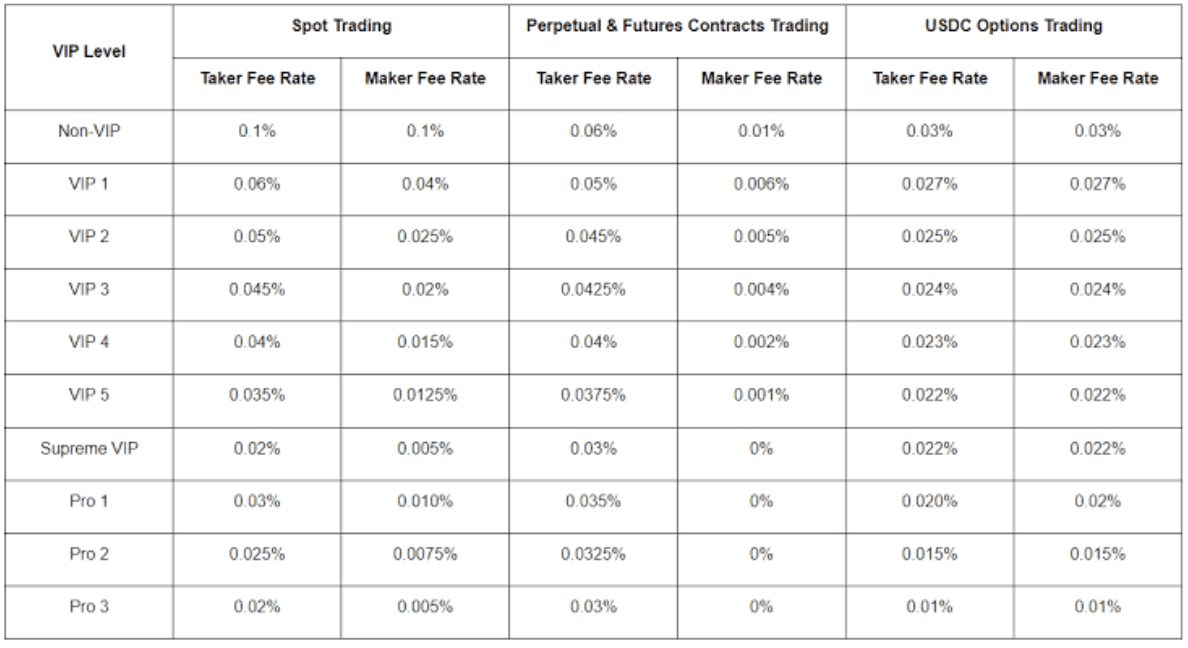
Different crypto networks have different fees. Source: HedgeWithCrypto.
Here are some easy ways to avoid high crypto fees:
Transact during off-peak hours: Just like traffic slows down after rush hour, crypto fees drop when fewer people use the network. Try sending transactions late at night or on weekends when the network is less busy.
Use low-fee cryptos: Some cryptos are just cheaper to use. Instead of using high-fee networks like Ethereum, go for alternatives like Solana, Binance Smart Chain, or Ripple. These options offer much lower fees.
Check and compare fees: Before you hit “send” on your crypto transaction, check the fees. Different cryptos and platforms have other costs, so make a quick comparison to make sure you're getting the best deal.
Use platforms like CoinCROWD: CoinCROWD is an excellent platform for keeping your transaction costs low. We specialize in low-fee crypto transactions, so you’ll save money while using a reliable platform.
Bundle your transactions: If you have several crypto payments to make, try combining them into one transaction. This reduces the number of fees you’ll pay overall.
Use Layer 2 solutions: Platforms like Polygon or Arbitrum help you use Ethereum but at a fraction of the cost. These solutions take some of the load off the leading Ethereum network to keep the fees lower.
Stay updated: Gas fees fluctuate all the time. Use fee monitoring tools like CryptoCompare to keep an eye on the best times to transact and avoid paying too much.
If you follow these tips, you will save on fees and make your crypto transactions more affordable.
Low-Fee Cryptos to Consider
Here’s a list of low-fee cryptocurrencies:
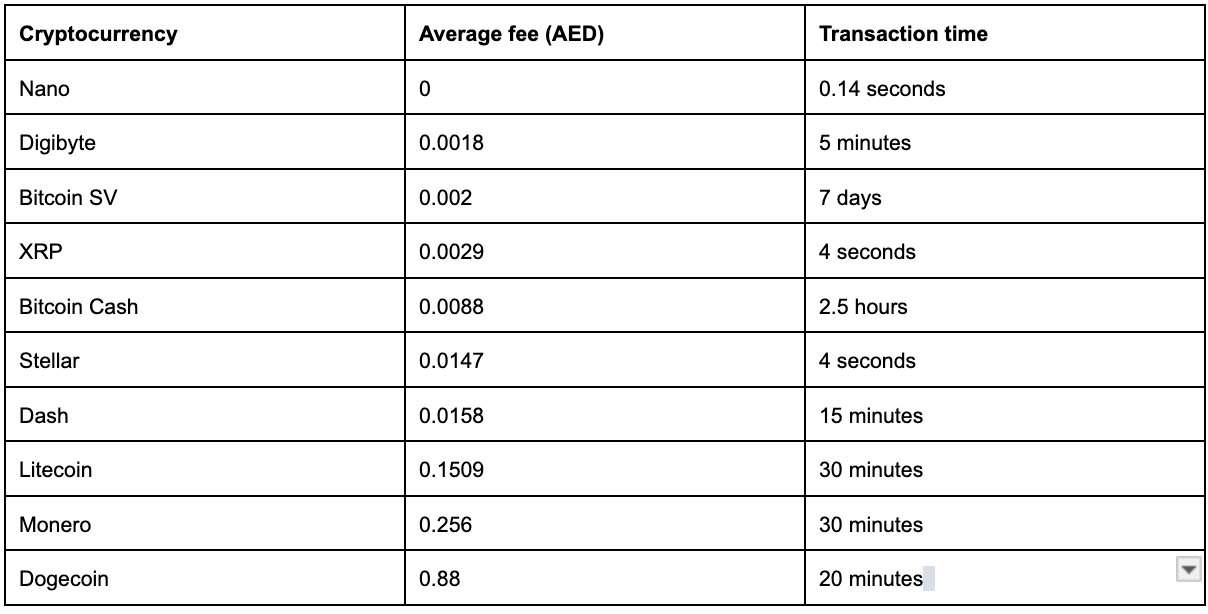
Why Their Fees Are Low?
Nano uses a special voting system — Open Representative — instead of traditional mining, and that makes transactions free.
Digibyte uses multiple mining methods to reduce costs while keeping it secure.
Bitcoin SV increased the block size to handle more transactions, which lowers fees.
XRP and Stellar are designed for fast, low-cost payments, which makes their fees minimal.
Litecoin and Bitcoin Cash aim to improve Bitcoin’s original structure, which helps reduce fees.
Best Blockchain Choices for Different Spending Needs
Everyday Small Transactions - Nano, it offers instant, feeless transactions, making it ideal for small, frequent purchases like coffee or micropayments.
High-Frequency Transactions - Solana, it's high throughput (65,000 TPS) and low fees make it perfect for applications needing fast, large volumes of transactions, such as gaming and DeFi.
Cross-Border Payments - Stellar, it is designed for low-cost, quick international transfers, making it ideal for remittances and currency conversions.
Secure Transactions - DigiByte (DGB), DigiByte’s multi-layered security and low fees make it suitable for secure transactions, especially for higher-value purchases.
Conclusion
Cryptocurrency fees don’t have to be a barrier to spending. By understanding how transaction fees work and choosing the right blockchain, you can enjoy a faster, cheaper, and more efficient payment experience than traditional financial systems.
For a versatile, cost-effective blockchain, Solana leads with its high speed and low fees, making it suitable for diverse spending needs. Nano is best for zero-fee, everyday transactions, while Stellar excels in cross-border payments. Ultimately, choose the blockchain that matches your transaction type, frequency, and need for security or global access.
Yes, cryptocurrency is the future of money and all. But are crypto transaction fees way too high? Well, if you've ever had this thought, you're not alone. Bitcoin fees, for example, average between AED 1.84 and AED 25 per transaction, while cash payments often come with a 2.09% fee. Don't forget that for traditional payments, there are also charges like processing and documentation fees, which can range from AED 315 to AED 1,050.
So, are crypto transactions that expensive? Read on as we break this down. You will discover why these crypto fees exist and, more importantly, how you can keep them as low as possible.
What Are Crypto Transaction Fees?
Crypto transaction fees, or gas fees, are small payments you make when making transactions through crypto. These fees go to miners or validators, who process your transactions and keep the blockchain secure. It is just like paying delivery fees when you order food online — a small charge to get the service done. Without these fees, your transaction would not be processed.

Average Bitcoin gas fee between 2017 and 2023. Source: The Block.
Different cryptocurrencies have different fees. For example, the average cost for Bitcoin right now is AED 25, while Ethereum is 11.8 Gwei, and Ripple is less than AED 1. The price depends on how busy the network is and how complex your transaction is. If a lot of people are using the blockchain at the same time, fees go up because everyone’s competing to get their transaction through faster.
Here’s a look at the average fees for popular cryptocurrencies:

Each blockchain has its own fee system, but if you know when and how to transact, you can save a lot.
Traditional Payment Fees vs. Crypto Fees
Crypto transaction fees are often much cheaper than traditional payment systems like credit cards, bank transfers, or checks. Let’s break it down in a way that makes sense.
When you buy something online using your bank credit card, the store pays a processing fee of 1.5% to 3.5% of your total purchase. For example, if you buy shoes for AED 500, the store might pay up to AED 17.50 in fees just to accept your card.
Debit cards are cheaper for businesses, with an average fee of 0.74% or about AED 1.70 per transaction. These fees are there because card networks (like Visa or Mastercard) and banks charge to process the payment and make sure it goes through safely.
Wire transfer is another traditional payment method. If you send money to someone in another country, it could cost you between AED 128.45 and AED 183.50. Even domestic transfers can cost AED 0.50 to AED 128.45.
The high cost is due to the fact that banks have to handle currency conversions and double-check every detail to avoid errors. Checks, though rare these days, cost businesses anywhere from AED 14.68 to AED 73.40 per check due to bank fees, labor, and postage.

Ethereum gas fee between 2016 and 2024. Source: EtherScan.
In comparison, crypto fees are most times lower, depending on the cryptocurrency you use. For instance, Ethereum's average transaction fee is around 0.24 Gwei (AED 0.88), which is far cheaper than an international wire transfer.
Ripple is even cheaper at just $0.01 (AED 0.04) per transaction. The reason crypto is more affordable is that it cuts out middlemen (banks and payment processors), and transactions are directly processed on the blockchain.
Here’s a table to quickly compare the fees:

As you have seen, crypto transaction fees are generally lower than traditional systems, especially for large or international payments. Plus, when you choose the right crypto, you can save even more.
Breaking Down Gas Fees
Gas fees are like the service charges you pay for using the blockchain networks. When you send crypto or use smart contracts, the network needs to do some "work" to process your transaction, and it is the gas fees that cover this work. The amount you pay for gas depends on how busy the network is and how much computational power your transaction needs.
Here’s a breakdown of why gas fees might go up:
1. Network Traffic

Number of crypto users between 2016 and 2024. Source: Statista.
Cryptocurrency has surged in demand as there are more users and dApps. So, imagine trying to order food online when there's a big event nearby. The more people order food at the same time, the longer it takes to get your food, and you might even have to pay more for faster delivery. Blockchain networks work in a similar way. When too many people use the network at once, the fees rise because everyone’s trying to get their transactions through quickly.
2. Transaction Complexity
Sending crypto is usually cheap and easy. But if you’re using apps that are complicated on the blockchain, like DeFi or NFTs, it’s like ordering a five-course meal instead of a simple sandwich. More complex transactions use more computing power, and that pushes the fees up.
3. Block Size Limits
Blockchain transactions are packed into blocks, but each block can only handle so much data. When the network is crowded, miners will choose to process transactions from those willing to pay more in gas fees first, while others wait longer and might even have to pay more if the block is full.
In short, gas fees increase based on how busy the network is, how complex your transaction is, and how much space is available in the next block.
How to Avoid High Crypto Fees

Different crypto networks have different fees. Source: HedgeWithCrypto.
Here are some easy ways to avoid high crypto fees:
Transact during off-peak hours: Just like traffic slows down after rush hour, crypto fees drop when fewer people use the network. Try sending transactions late at night or on weekends when the network is less busy.
Use low-fee cryptos: Some cryptos are just cheaper to use. Instead of using high-fee networks like Ethereum, go for alternatives like Solana, Binance Smart Chain, or Ripple. These options offer much lower fees.
Check and compare fees: Before you hit “send” on your crypto transaction, check the fees. Different cryptos and platforms have other costs, so make a quick comparison to make sure you're getting the best deal.
Use platforms like CoinCROWD: CoinCROWD is an excellent platform for keeping your transaction costs low. We specialize in low-fee crypto transactions, so you’ll save money while using a reliable platform.
Bundle your transactions: If you have several crypto payments to make, try combining them into one transaction. This reduces the number of fees you’ll pay overall.
Use Layer 2 solutions: Platforms like Polygon or Arbitrum help you use Ethereum but at a fraction of the cost. These solutions take some of the load off the leading Ethereum network to keep the fees lower.
Stay updated: Gas fees fluctuate all the time. Use fee monitoring tools like CryptoCompare to keep an eye on the best times to transact and avoid paying too much.
If you follow these tips, you will save on fees and make your crypto transactions more affordable.
Low-Fee Cryptos to Consider
Here’s a list of low-fee cryptocurrencies:

Why Their Fees Are Low?
Nano uses a special voting system — Open Representative — instead of traditional mining, and that makes transactions free.
Digibyte uses multiple mining methods to reduce costs while keeping it secure.
Bitcoin SV increased the block size to handle more transactions, which lowers fees.
XRP and Stellar are designed for fast, low-cost payments, which makes their fees minimal.
Litecoin and Bitcoin Cash aim to improve Bitcoin’s original structure, which helps reduce fees.
Best Blockchain Choices for Different Spending Needs
Everyday Small Transactions - Nano, it offers instant, feeless transactions, making it ideal for small, frequent purchases like coffee or micropayments.
High-Frequency Transactions - Solana, it's high throughput (65,000 TPS) and low fees make it perfect for applications needing fast, large volumes of transactions, such as gaming and DeFi.
Cross-Border Payments - Stellar, it is designed for low-cost, quick international transfers, making it ideal for remittances and currency conversions.
Secure Transactions - DigiByte (DGB), DigiByte’s multi-layered security and low fees make it suitable for secure transactions, especially for higher-value purchases.
Conclusion
Cryptocurrency fees don’t have to be a barrier to spending. By understanding how transaction fees work and choosing the right blockchain, you can enjoy a faster, cheaper, and more efficient payment experience than traditional financial systems.
For a versatile, cost-effective blockchain, Solana leads with its high speed and low fees, making it suitable for diverse spending needs. Nano is best for zero-fee, everyday transactions, while Stellar excels in cross-border payments. Ultimately, choose the blockchain that matches your transaction type, frequency, and need for security or global access.
Yes, cryptocurrency is the future of money and all. But are crypto transaction fees way too high? Well, if you've ever had this thought, you're not alone. Bitcoin fees, for example, average between AED 1.84 and AED 25 per transaction, while cash payments often come with a 2.09% fee. Don't forget that for traditional payments, there are also charges like processing and documentation fees, which can range from AED 315 to AED 1,050.
So, are crypto transactions that expensive? Read on as we break this down. You will discover why these crypto fees exist and, more importantly, how you can keep them as low as possible.
What Are Crypto Transaction Fees?
Crypto transaction fees, or gas fees, are small payments you make when making transactions through crypto. These fees go to miners or validators, who process your transactions and keep the blockchain secure. It is just like paying delivery fees when you order food online — a small charge to get the service done. Without these fees, your transaction would not be processed.

Average Bitcoin gas fee between 2017 and 2023. Source: The Block.
Different cryptocurrencies have different fees. For example, the average cost for Bitcoin right now is AED 25, while Ethereum is 11.8 Gwei, and Ripple is less than AED 1. The price depends on how busy the network is and how complex your transaction is. If a lot of people are using the blockchain at the same time, fees go up because everyone’s competing to get their transaction through faster.
Here’s a look at the average fees for popular cryptocurrencies:

Each blockchain has its own fee system, but if you know when and how to transact, you can save a lot.
Traditional Payment Fees vs. Crypto Fees
Crypto transaction fees are often much cheaper than traditional payment systems like credit cards, bank transfers, or checks. Let’s break it down in a way that makes sense.
When you buy something online using your bank credit card, the store pays a processing fee of 1.5% to 3.5% of your total purchase. For example, if you buy shoes for AED 500, the store might pay up to AED 17.50 in fees just to accept your card.
Debit cards are cheaper for businesses, with an average fee of 0.74% or about AED 1.70 per transaction. These fees are there because card networks (like Visa or Mastercard) and banks charge to process the payment and make sure it goes through safely.
Wire transfer is another traditional payment method. If you send money to someone in another country, it could cost you between AED 128.45 and AED 183.50. Even domestic transfers can cost AED 0.50 to AED 128.45.
The high cost is due to the fact that banks have to handle currency conversions and double-check every detail to avoid errors. Checks, though rare these days, cost businesses anywhere from AED 14.68 to AED 73.40 per check due to bank fees, labor, and postage.

Ethereum gas fee between 2016 and 2024. Source: EtherScan.
In comparison, crypto fees are most times lower, depending on the cryptocurrency you use. For instance, Ethereum's average transaction fee is around 0.24 Gwei (AED 0.88), which is far cheaper than an international wire transfer.
Ripple is even cheaper at just $0.01 (AED 0.04) per transaction. The reason crypto is more affordable is that it cuts out middlemen (banks and payment processors), and transactions are directly processed on the blockchain.
Here’s a table to quickly compare the fees:

As you have seen, crypto transaction fees are generally lower than traditional systems, especially for large or international payments. Plus, when you choose the right crypto, you can save even more.
Breaking Down Gas Fees
Gas fees are like the service charges you pay for using the blockchain networks. When you send crypto or use smart contracts, the network needs to do some "work" to process your transaction, and it is the gas fees that cover this work. The amount you pay for gas depends on how busy the network is and how much computational power your transaction needs.
Here’s a breakdown of why gas fees might go up:
1. Network Traffic

Number of crypto users between 2016 and 2024. Source: Statista.
Cryptocurrency has surged in demand as there are more users and dApps. So, imagine trying to order food online when there's a big event nearby. The more people order food at the same time, the longer it takes to get your food, and you might even have to pay more for faster delivery. Blockchain networks work in a similar way. When too many people use the network at once, the fees rise because everyone’s trying to get their transactions through quickly.
2. Transaction Complexity
Sending crypto is usually cheap and easy. But if you’re using apps that are complicated on the blockchain, like DeFi or NFTs, it’s like ordering a five-course meal instead of a simple sandwich. More complex transactions use more computing power, and that pushes the fees up.
3. Block Size Limits
Blockchain transactions are packed into blocks, but each block can only handle so much data. When the network is crowded, miners will choose to process transactions from those willing to pay more in gas fees first, while others wait longer and might even have to pay more if the block is full.
In short, gas fees increase based on how busy the network is, how complex your transaction is, and how much space is available in the next block.
How to Avoid High Crypto Fees

Different crypto networks have different fees. Source: HedgeWithCrypto.
Here are some easy ways to avoid high crypto fees:
Transact during off-peak hours: Just like traffic slows down after rush hour, crypto fees drop when fewer people use the network. Try sending transactions late at night or on weekends when the network is less busy.
Use low-fee cryptos: Some cryptos are just cheaper to use. Instead of using high-fee networks like Ethereum, go for alternatives like Solana, Binance Smart Chain, or Ripple. These options offer much lower fees.
Check and compare fees: Before you hit “send” on your crypto transaction, check the fees. Different cryptos and platforms have other costs, so make a quick comparison to make sure you're getting the best deal.
Use platforms like CoinCROWD: CoinCROWD is an excellent platform for keeping your transaction costs low. We specialize in low-fee crypto transactions, so you’ll save money while using a reliable platform.
Bundle your transactions: If you have several crypto payments to make, try combining them into one transaction. This reduces the number of fees you’ll pay overall.
Use Layer 2 solutions: Platforms like Polygon or Arbitrum help you use Ethereum but at a fraction of the cost. These solutions take some of the load off the leading Ethereum network to keep the fees lower.
Stay updated: Gas fees fluctuate all the time. Use fee monitoring tools like CryptoCompare to keep an eye on the best times to transact and avoid paying too much.
If you follow these tips, you will save on fees and make your crypto transactions more affordable.
Low-Fee Cryptos to Consider
Here’s a list of low-fee cryptocurrencies:

Why Their Fees Are Low?
Nano uses a special voting system — Open Representative — instead of traditional mining, and that makes transactions free.
Digibyte uses multiple mining methods to reduce costs while keeping it secure.
Bitcoin SV increased the block size to handle more transactions, which lowers fees.
XRP and Stellar are designed for fast, low-cost payments, which makes their fees minimal.
Litecoin and Bitcoin Cash aim to improve Bitcoin’s original structure, which helps reduce fees.
Best Blockchain Choices for Different Spending Needs
Everyday Small Transactions - Nano, it offers instant, feeless transactions, making it ideal for small, frequent purchases like coffee or micropayments.
High-Frequency Transactions - Solana, it's high throughput (65,000 TPS) and low fees make it perfect for applications needing fast, large volumes of transactions, such as gaming and DeFi.
Cross-Border Payments - Stellar, it is designed for low-cost, quick international transfers, making it ideal for remittances and currency conversions.
Secure Transactions - DigiByte (DGB), DigiByte’s multi-layered security and low fees make it suitable for secure transactions, especially for higher-value purchases.
Conclusion
Cryptocurrency fees don’t have to be a barrier to spending. By understanding how transaction fees work and choosing the right blockchain, you can enjoy a faster, cheaper, and more efficient payment experience than traditional financial systems.
For a versatile, cost-effective blockchain, Solana leads with its high speed and low fees, making it suitable for diverse spending needs. Nano is best for zero-fee, everyday transactions, while Stellar excels in cross-border payments. Ultimately, choose the blockchain that matches your transaction type, frequency, and need for security or global access.
Future of Crypto is Here
Join for early bird access, perks and more!
Future of Crypto is Here
Join for early bird access, perks and more!
Future of Crypto is Here
Join for early bird access, perks and more!
Future of Crypto is Here
Join for early bird access, perks and more!
Future of Crypto is Here
Join for early bird access, perks and more!
Future of Crypto is Here
Join for early bird access, perks and more!
